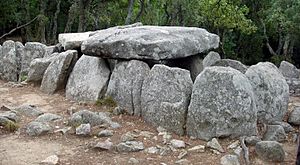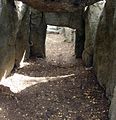Cova d'en Daina facts for kids
The Cova d'en Daina (which means Daina's Cave in English) is an ancient stone structure called a dolmen. You can find it close to Romanyà de la Selva, in the area of Santa Cristina d'Aro, Catalonia, Spain. It's a really old monument that tells us about people who lived a long, long time ago!
What is Cova d'en Daina?
This amazing megalith (which means "big stone" structure) was built using huge granite rocks. Experts believe it was put together between 2700 and 2200 BCE (that's Before Common Era, or before the year zero). Imagine building something so big without modern tools!
A person named Pere Cama i Casas first found this dolmen. The first time it was written about was in 1894 by Agustí Casas. Later, an archaeologist named Lluís Esteva Cruañas dug around the site. He found some really interesting things, like human bones and teeth, sharp arrowheads made of flint, pieces of old knives and pottery, and even pretty necklace beads. This tells us it was likely used as a burial place.
In the 1950s, parts of the dolmen were carefully put back together. The Cova d'en Daina is about seven meters long. It has a path that leads into a special room, which was probably the funeral chamber. Around this chamber, there's a circular mound of earth and stones called a tumulus, which is about 10 meters wide. The entrance of the tomb faces southeast. This is cool because it means sunlight can shine right into the inside during the winter solstice (the shortest day of the year).
Gallery
See also
 In Spanish: Cueva de Daina para niños
In Spanish: Cueva de Daina para niños








